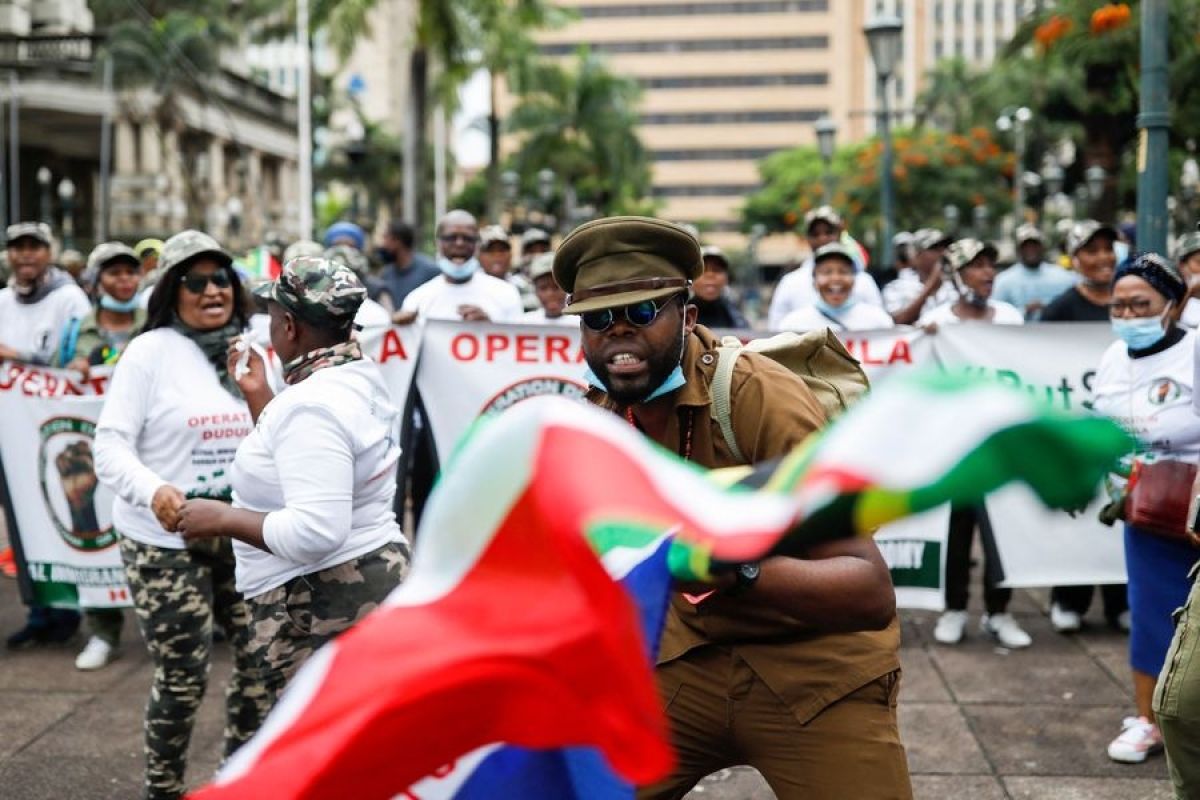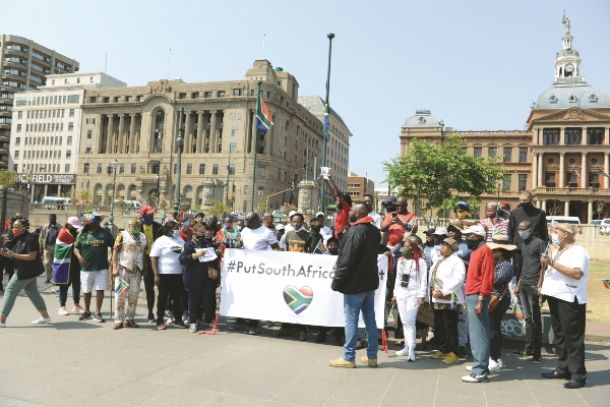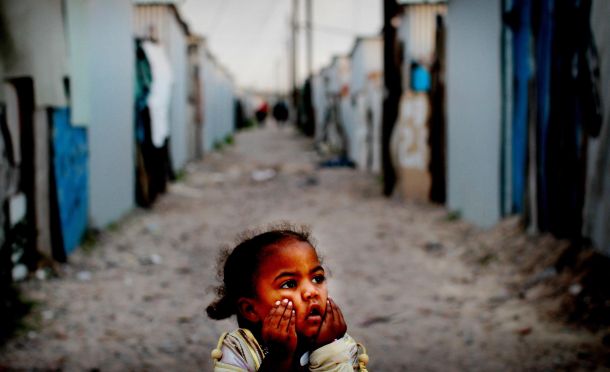
As South Africa sees a resurgence of xenophobic attacks against migrants from the rest of Africa, we investigate what is behind the explosion in vigilante violence, and why the ANC government is doing little to stop the ethnic cleansing.
A pile of ashes was all that remained of Elvis Nyathi.
The 43-year-old Zimbabwean was brutally murdered by vigilantes on April 6 mere footsteps from his Diesploot home. His only crime was not presenting a passport.
His widow, Nomsa Tshuma, was spared after she showed them her ID to the vigilante thugs.
The horrible crime, which began with the demand for identification papers, saw Nyathi dragged out of his home in a township near Johannesburg and, with his hands tied behind his back, beaten, stoned, and set on fire in the next street over.
A resident who lives meters from where Nyathi's body was found told the Dailymaverick newspaper: ‘I heard a lot of noise, but I didn't go out, because there were dangerous people. I heard people making noise and arguing. When the police came, they ran away.'
Nyathi's brother Godknows said that the father of four ‘was not a criminal’.
‘They just killed him for no reason. He was a good man. I don't feel safe here in Diepsloot.'
The victim’s widow recounted how the last time she saw her husband alive he was bloodied and unable to speak, surrounded by an angry mob of about 30 people demanding R300 – roughly $19 – and that she showed them where her husband kept his gun, a gun he did not have.
Tshuma handed over the family's last R50. Dissatisfied with this, the crowd dragged Nyathi away.
Fearing for her life, Tshuma remained inside the house and started calling Nyathi's relatives. Moments later, someone came running back to Tshuma, saying that her husband had been set on fire in the next street over.
Nyathi’s grisly slaying is by means unique.
He is just the latest victim of a growing wave of attacks on illegal immigrants in Gauteng province, where, since June last year, vigilante groups have launched Operation Dudula (Zulu for ‘push back’).
The vigilantes blame foreigners for high rates of unemployment and crime, falling wages, drug trafficking, lack of housing and public health facilities, and are calling on them to be deported.
South Africa has been a magnet for economic migrants in search of better job prospects in the region.
The country attracts people not only from neighboring Lesotho, Mozambique and Zimbabwe, but also from Congo, Ethiopia, Malawi, Nigeria, South Asia and Europe.
It is home to just under four million foreigners, according to the Risenga Maluleke General Statistics. There is no data that accounts for illegal aliens.
Since the end of apartheid, South Africa has been plagued by anti-immigrant riots, with hundreds killed and tens of thousands forced out of their homes.
The years immediately after the African National Congress (ANC) took power, 1994/1995, saw the highest number of attacks, while the issue drew global attention in 2008 when the fiery flames of hatred engulfed almost every big city, including the tourist capital of Cape Town.
Sixty-eight people, including many Zimbabweans, were butchered during that outbreak in violence.
Scapegoating migrants
The United Nations (UN) expressed concern about the ongoing violence, intimidation, and harassment of foreigners in South Africa and urged the government to ensure that their human rights are respected.
The acting head of the UN in South Africa, Ayodele Odusola, criticised the brutal murder of the latest Zimbabwean victim stating: ‘It is deeply concerning and regrettable that this is happening in a country with one of the most inclusive constitutions in the world.’
After the death of Nyathi, Amnesty International criticised the South African government in a statement, saying that 'foreigners have become scapegoats for crime-ridden communities’.
A South African resident of Diepsloot, who did not want to give his name, echoed this and said that illegal foreigners were not the problem.
‘The problem here is the tsotsis [criminals],' he said. 'I am from Limpopo; I am South African. It is very dangerous to live here in Diepsloot. They [criminals] knock on your door at night, saying, 'Open up, open up.' They beat me, they take my clothes, they say: 'Where is your phone?'
'They take phones, they take money. If you don't have money and he has a gun, he shoots and kills you. People say they are foreigners, but...they are not foreigners...the problem is crime.'
Another resident, who did not want to be identified, said that foreigners are welcome in Diepsloot.
'People are cheating other people to gain what they want to gain. But the fact is that they are destroying us and making the community fight among themselves. We love people, we are human beings. Whoever is a foreigner, is welcome here. The problem here is crime.’
Zimbabwean community spokesman Bongani Mkhwanazi said it was ‘painful’ that one of his countrymen could be so brutally murdered ‘because he did not have proper documents'.
'We feel that law enforcement is passive about this Operation Dudula matter. These vigilante groups have been harassing people for a long time.’
It’s a view shared by the Nigerian Ambassador to South Africa, Karibu Bala.
'We are deeply concerned when Nigerians and indeed African citizens of foreign origin in South Africa are beaten left, right and center by individuals or groups of individuals for whatever reason,’ he said.
‘We are always the scapegoat when things are hot in South Africa.’
Blessing, an undocumented immigrant who works as a street vendor, said she lives under constant fear of xenophobic violence.
'I have been in this country for 10 years, my children were born in this country, but the people in this country hate us,' she lamented, asking that her last name be omitted for fear of reprisals.
‘My children don't have birth certificates either. I am very afraid for them. Maybe if their leader is locked up, we will have peace again.’
Sitshiwe Mafunga, originally from Zimbabwe, has lived in Diepsloot for 10 years.
She runs a beauty salon and a sewing business in the Extension 4 district of Diepsloot.
'I am constantly scared now, although I have legal documents to be here. It is wrong that people are killed because they come from outside South Africa, because after all we are all Africans and human beings. We are scared now and constantly lock ourselves in our homes.’
‘The police must do their job and arrest the criminals. Crime has no nationality, because the criminals here are also South Africans,' added Mafunga.
President Cyril Ramaphosa has condemned the police over their response to the attacks, accusing some officers of acting like the attackers themselves by asking suspected foreigners to present their identity documents.
‘Obviously, we cannot accept behavior like this where people are hunted down in this way and are questioned in this way about their own identity because it takes us back to the apartheid way of doing things.’
‘We are now in a democracy and we must be very restrained and respect the rights of people in our country.’
Anti-immigrant groups
With a staggering 35 per cent unemployment rate, many marginalised locals have turned to groups like the All Truck Drivers Foundation (ATDF), the South Africa First Party (SAF) and the online movement #PutSouthAfricansFirst, all of which blame immigration for the lack of jobs.
Operation Dudula, meanwhile, has been holding demonstrations since the start of the year to demand concrete measures from the government against illegal immigrants in South Africa.
A street vendor, Kgole, said she joined Dudula because more proactive measures must be taken to reduce the number of foreigners in the country.
'These people from Maputo (Mozambique), Malawi, Zimbabwe, they must go,' she said. ‘We don't want them here.’
Another vigilante supporter and businesswoman from nearby Soweto added: ‘I am very dismayed with our country and disappointed with the ANC. They [the ANC] don't take care of us. Everything is dirty, there is no service delivery, but the worst of the worst is crime.'
Another Soweto resident, Maleke, lamented how restaurants often hire undocumented foreigners for lower wages.
'The police should be the ones doing this work, investigating the migrants' involvement in crime.'
Meanwhile, Thabo Maleke, 32, who lost his job as a waiter at Nando's during the Covid lockdowns, said he didn’t blame immigrants for the fact he has been unable to find a new job.
Julius Malema, leader of the populist Economic Freedom Fighters (EFF) party, has tried to pressure restaurant owners to hire more South Africans and fewer foreigners.
Keen to capitalise on the antipathy towards foreigners, other smaller parties such as ActionSA and the Patriotic Alliance (PA) campaigned against illegal immigration in local elections last year that saw the ANC vote drop below 50 percent for the first time.
ActionSA won 16 per cent of the vote in Johannesburg in those municipal elections. Its leader, former mayor Herman Mashaba, has demanded that undocumented immigrants be deported.
More recently still, the mayor of Central Karoo and chairman of the Patriotic Alliance (PA), Gayton McKenzie, called illegal immigrants a smear during his inaugural speech on April 11 this year, adding: ‘The Central Karoo will be an illegal immigrant free zone.’
South Africa’s main opposition Democratic Alliance has said that if Operation Dudula continues unabated it will lead to riots.
Government inertia
The ambiguous statements by some politicians are seen as fueling hatred against foreigners. A recent report by the non-governmental organization Human Rights Watch (HRW) accused law enforcement officials of being complicit in violence, often operating in a discriminatory and abusive manner towards foreigners.
The South African government has not been very receptive to immigrants and is currently drafting legislation that will make it harder for them to work. Interior Minister Aaron Motsoaledi said that these measures are necessary to combat unemployment among locals.
Lockdown-induced job losses have exacerbated an already dire economic situation, tempting many to use foreigners as scapegoats, said Frans Viljoen, director of the Centre for Human Rights at the University of Pretoria.
‘It is misguided and inappropriate to target foreigners in South Africa. We all know that after Covid-19, economic stagnation created discomfort and there is a search for culprits.’
Almost 900,000 African citizens migrated to the country on a net basis between 2016 and 2021, according to Statistics South Africa.
There are also more than 153,000 asylum applications pending in South Africa, according to Amnesty International.
Analysts and activists say the ANC government incubated vigilante governance through its local cooperation with mafia-style protection schemes operating as municipal associations, truck and cab federations, and business forums.
‘These groups were allowed to operate with a lot of impunity, but at a very local level,' said Loren Landau, co-director of the Wits-Oxford Mobility Governance Lab at the University of the Witwatersrand, Johannesburg.
'What's happening now is that the political landscape has become more complicated with the ruling party losing its hegemony.’
Zama Ndlovu, a social activist, said Operation Dudula, is probably just the beginning of bad things to come.
'When politicians blame foreigners for crime and unemployment, it is important to talk about the economy and remind people that economic and political choices have brought us to this point, not African foreigners.’
Ralph Mathekga, an independent politician, warned that while Operation Dudula ‘is not a political party' and ‘doesn't have a formal leadership structure’, it is emerging as an 'alternative way of contesting power' as the ANC declines.
He explained that the movement is rooted in scores of young people who are economically and socially frustrated. 'People turn to them because they are desperate and as the formal authority, such as the local ANC leadership, has collapsed.’
The lack of accountability for widespread civil unrest last year, in which ANC infighting led to mass looting that killed hundreds, has also fueled a sense of impunity for political violence, the analyst Loren Landau added.
‘What we are seeing is the normalisation of violence as a form of political negotiation.
‘What we need to understand is that the problem is not the increase in the number of migrants. The [net] numbers have been going down. It's really about fundamental flaws in the South African political system.'





